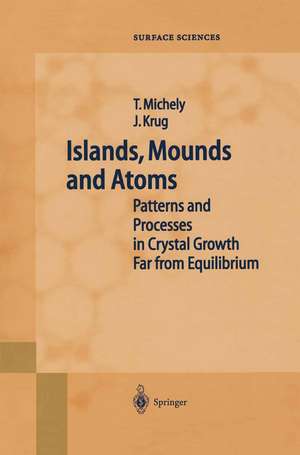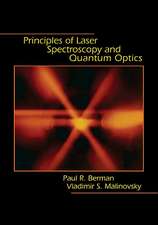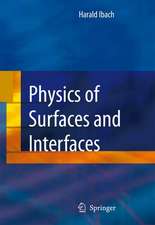Islands, Mounds and Atoms: Springer Series in Surface Sciences, cartea 42
Autor Thomas Michely, Joachim Krugen Limba Engleză Paperback – 21 ian 2013
| Toate formatele și edițiile | Preț | Express |
|---|---|---|
| Paperback (1) | 1001.02 lei 6-8 săpt. | |
| Springer Berlin, Heidelberg – 21 ian 2013 | 1001.02 lei 6-8 săpt. | |
| Hardback (1) | 1006.87 lei 6-8 săpt. | |
| Springer Berlin, Heidelberg – 10 oct 2003 | 1006.87 lei 6-8 săpt. |
Din seria Springer Series in Surface Sciences
- 18%
 Preț: 1131.25 lei
Preț: 1131.25 lei - 15%
 Preț: 654.77 lei
Preț: 654.77 lei - 18%
 Preț: 1113.09 lei
Preț: 1113.09 lei -
 Preț: 390.63 lei
Preț: 390.63 lei -
 Preț: 407.98 lei
Preț: 407.98 lei - 15%
 Preț: 657.57 lei
Preț: 657.57 lei - 15%
 Preț: 636.63 lei
Preț: 636.63 lei - 15%
 Preț: 641.20 lei
Preț: 641.20 lei - 15%
 Preț: 651.19 lei
Preț: 651.19 lei - 15%
 Preț: 645.60 lei
Preț: 645.60 lei - 15%
 Preț: 632.70 lei
Preț: 632.70 lei - 15%
 Preț: 640.24 lei
Preț: 640.24 lei - 15%
 Preț: 646.11 lei
Preț: 646.11 lei -
 Preț: 397.38 lei
Preț: 397.38 lei -
 Preț: 386.22 lei
Preț: 386.22 lei -
 Preț: 387.75 lei
Preț: 387.75 lei -
 Preț: 389.31 lei
Preț: 389.31 lei -
 Preț: 399.12 lei
Preț: 399.12 lei -
 Preț: 406.42 lei
Preț: 406.42 lei - 18%
 Preț: 1011.14 lei
Preț: 1011.14 lei - 18%
 Preț: 2100.88 lei
Preț: 2100.88 lei -
 Preț: 398.35 lei
Preț: 398.35 lei -
 Preț: 392.21 lei
Preț: 392.21 lei -
 Preț: 389.88 lei
Preț: 389.88 lei - 15%
 Preț: 646.43 lei
Preț: 646.43 lei - 15%
 Preț: 643.16 lei
Preț: 643.16 lei - 15%
 Preț: 643.65 lei
Preț: 643.65 lei - 18%
 Preț: 948.79 lei
Preț: 948.79 lei - 15%
 Preț: 641.03 lei
Preț: 641.03 lei - 15%
 Preț: 640.55 lei
Preț: 640.55 lei - 15%
 Preț: 640.71 lei
Preț: 640.71 lei - 18%
 Preț: 952.72 lei
Preț: 952.72 lei - 18%
 Preț: 955.08 lei
Preț: 955.08 lei - 15%
 Preț: 648.42 lei
Preț: 648.42 lei - 15%
 Preț: 641.03 lei
Preț: 641.03 lei - 18%
 Preț: 1000.42 lei
Preț: 1000.42 lei - 18%
 Preț: 952.57 lei
Preț: 952.57 lei
Preț: 1001.02 lei
Preț vechi: 1220.75 lei
-18% Nou
Puncte Express: 1502
Preț estimativ în valută:
191.54€ • 200.52$ • 158.49£
191.54€ • 200.52$ • 158.49£
Carte tipărită la comandă
Livrare economică 05-19 aprilie
Preluare comenzi: 021 569.72.76
Specificații
ISBN-13: 9783642622373
ISBN-10: 3642622372
Pagini: 336
Ilustrații: XVIII, 315 p.
Dimensiuni: 155 x 235 x 18 mm
Greutate: 0.48 kg
Ediția:Softcover reprint of the original 1st ed. 2004
Editura: Springer Berlin, Heidelberg
Colecția Springer
Seria Springer Series in Surface Sciences
Locul publicării:Berlin, Heidelberg, Germany
ISBN-10: 3642622372
Pagini: 336
Ilustrații: XVIII, 315 p.
Dimensiuni: 155 x 235 x 18 mm
Greutate: 0.48 kg
Ediția:Softcover reprint of the original 1st ed. 2004
Editura: Springer Berlin, Heidelberg
Colecția Springer
Seria Springer Series in Surface Sciences
Locul publicării:Berlin, Heidelberg, Germany
Public țintă
ResearchCuprins
1. Introduction.- 1.1 Atoms, Crystals and Visualization.- 1.2 Crystal Growth Far from Equilibrium.- 1.3 Epitaxy.- 1.4 About this Book.- 2. Condensation, Diffusion and Nucleation.- 2.1 Arriving at the Surface: Sticking and Transient Mobility.- 2.2 Moving on: Surface Diffusion.- 2.3 Getting Together: Two-Dimensional Nucleation.- 2.4 Supplementary Topics.- 3. Island Shapes.- 3.1 Island Shapes and the Hierarchy of Diffusion Processes.- 3.2 The Equilibrium Shape of Adatom and Vacancy Islands.- 3.3 Fractal-Dendritic Islands.- 3.4 Compact, Triangular Islands.- 3.5 Adsorbates and Island Shapes.- 3.6 Shape Instabilities and the Diffusion Field.- 3.7 Supplementary Topics.- 4. Pattern Formation in Multilayer Growth.- 4.1 The Temperature Dependence of Multilayer Growth.- 4.2 Statistical Growth and the Shape of Wedding Cakes.- 4.3 Interlayer Transport.- 4.4 Step Atomic Structure and Growth Modes on Pt(111).- 4.5 Mound Formation with Weak Barriers.- 4.6 Long Time Evolution of the Mound Morphology.- 4.7 Growth Instabilities of Vicinal Surfaces.- 4.8 Self-Affine Growth.- 4.9 Supplementary Topics.- 5. Layer-By-Layer Growth and Growth Manipulation.- 5.1 Basic Concepts.- 5.2 Layer-By-Layer Growth by Surfactants.- 5.3 Layer-By-Layer Growth Through Growth Manipulation.- 5.4 Layer-By-Layer Growth Through Surface Reconstruction.- 5.5 Theory of Pulsed Deposition.- 5.6 Kinetic Roughening and Layer-By-Layer Growth.- 6. Methods.- 6.1 Deposition and Vacuum.- 6.2 Microscopy.- 6.3 Diffraction.- 6.4 Total Energy Calculations.- 6.5 Growth Simulations.- References tb.
Textul de pe ultima copertă
Crystal growth far from thermodynamic equilibrium is nothing but homoepitaxy - thin film growth on a crystalline substrate of the same material. Because of the absence of misfit effects, homoepitaxy is an ideal playground to study growth kinetics in its pure form. Despite its conceptual simplicity, homoepitaxy gives rise to a wide range of patterns. This book explains the formation of such patterns in terms of elementary atomic processes, using the well-studied Pt/Pt(111) system as a reference point and a large number of Scanning Tunneling Microscopy images for visualization. Topics include surface diffusion, nucleation theory, island shapes, mound formation and coarsening, and layer-by-layer growth. A separate chapter is dedicated to describing the main experimental and theoretical methods. The text is aimed at physicists with an interest in growth kinetics, surface scientists, graduate students, and practitioners of thin film deposition.
Caracteristici
Many comparative representations (tables) of scanning tunneling microscope topographs, which give a very intuitive access to the problems Clear and simple style Ideal as an introduction to the new microscopic world opened by scanning tunneling microscopy for a broader readership (students, interested laymen) Includes supplementary material: sn.pub/extras

















